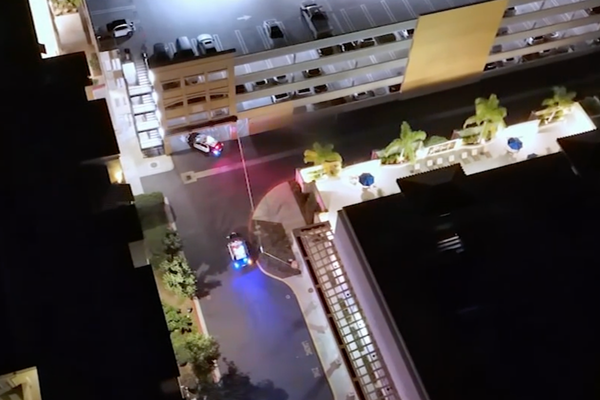
Nusa Lembongan, Indonesia – Five years ago, the beaches on Nusa Lembongan, a paradisal island half an hour’s speedboat ride from Bali, were pockmarked with the kind of rubbish that blights large stretches of Indonesia’s most famous tourist destination.
These days, Nusa Lembongan’s shorelines are squeaky clean and its once heavily-polluted river, home to an extensive system of mangroves, is pristine.
The turnaround has been credited in large part to the Lembongan Recycling Centre (LRC), a community-run facility that collects rubbish twice daily from businesses, homes and waste collection points on the island, and then sorts and compacts paper, plastic, metal and glass for sale.
Not only has the initiative increased environmental awareness among islanders, but it has also put a literal value on waste, giving residents a financial incentive to clean up their home.
“The mangroves were cleaned of metal, including old boat engines and motorbikes, when locals discovered the metal had value,” Margaret Barry, the Australian founder of the Bali Children’s Foundation, a non-profit that helps finance the LRC, told Al Jazeera.

Nusa Lembongan’s 8,000 people traditionally eked out a living from fishing and seaweed farming. That started to change about 20 years ago after the island was discovered by surfers and divers from Bali looking for uncrowded waves and coral reefs.
While tourism brought economic opportunity to Nusa Lembongan, it also brought vast quantities of inorganic waste. Over time, plastic water bottles, straws and other rubbish were dumped in a supposedly temporary landfill site on the island that was out-of-sight and out-of-mind of tourism, which is concentrated on the coast.
Within a decade, the landfill site became a small mountain belching harmful smoke from regular fires — the only way islanders knew how to get rid of the trash.
In 2016, Pilot, an islander who like many Indonesians goes by only one name, set up a simple sorting station for plastic waste on a plot he owned in the middle of the island. But with limited finances, just a fraction of the waste generated on the island was recycled.
In 2017, Putu, a staff member at the sorting station, took over the facility and erected a small building on the site.
The LRC was born the following year when an umbrella group that included social enterprise Bali Hope, community group Friends of Lembongan, and the Bali Children’s Foundation, as well as local hotels and restaurants, put up money for machinery and staff.
Suddenly, islanders had the option to send tonnes of waste to be recycled, shipped off the island and sold, instead of being burned or added to landfill.

“From my observation, when the LRC runs the island is very clean because they collect rubbish twice every day,” Oktavianus Agustus Pa Njola, an English teacher on Nusa Lembongan who has taken his students to the plant to learn about recycling, told Al Jazeera. “When they stop for just one day, rubbish starts to pile up on the side of the road again.”
Mitchell Ansiewicz, the owner of Ohana’s, a beachside resort on Nusa Lembongan that pays the LRC $50 per month to take its rubbish, said the initiative’s success can be attributed to its collaborative approach.
“Nusa Lembongan attracts a lot of divers, surfers and yogis — people who tend to care about the environment, already have recycling ingrained in their vernacular and who want to contribute. Many of them started initiatives over the years, beach clean-ups and so forth,” Ansiewicz told Al Jazeera.
“For one reason or another — perhaps the right palms weren’t greased or locals felt like they were being told what to do — they didn’t last or didn’t make much of a difference. But with the LRC there’s been good participation from the expat and the local community. When the forces come together, capital and labour, it made a monumental difference to the cleanliness of the island.”
Progress came to a halt during the pandemic when tourism evaporated, fuel for vehicles involved in rubbish collection became scarce, and most residents on the island returned to seaweed farming.
“During the pandemic, things went very slowly and the centre was not that effective,” LRC volunteer Kris, owner of Komodo Garden Guesthouse, told Al Jazeera. “But now we have good cooperation from the banjar [local government], which gave us three-wheel vehicles to collect rubbish and salary for 18 workers, and I collect money from hotels and restaurants each month. Now we are effective again.”

In November, LRC added a small community permaculture garden and aerobic composting program that produces eggplant, onions, ginger, garlic and other vegetables that are sold back to restaurants and hotels.
The organic compost is more effective and safer to handle than artificial fertilisers, according to the head gardener, Maharus. But not enough of it is being produced to expand the pilot-size garden because most islanders do not separate their rubbish at home, according to locals on Nusa Lembongan.
The mixing of organic and inorganic waste at home continues to be a problem not only in Nusa Lembongan but across Indonesia. Data compiled by the state-run National Solid Waste Management Information System shows that 42 percent of waste generated in the country is organic, making Indonesia the world’s second-largest contributor to food waste after Saudi Arabia. As a result of this cross-contamination in rubbish, recycling facilities in Indonesia capture less than 5 percent of waste generated, according to the World Bank, with the plastic recycling rate only marginally higher at 7 percent.
LRC’s stakeholders say they are continually looking for better ways to encourage islanders to separate their waste.
“We are trying to provide direction and understanding to the community to sort waste from their homes and even provide reciprocity in the form of economic value to stimulate the community in handling waste,” said Putu, the LRC manager. “But on this island, we must be extra patient and approach the community more so they can understand the importance of sorting trash from the starting point.”
Bayu Indrawan, director of the Center of Waste Management Indonesia in Jakarta, said LRC is a good example of a small community stepping up to solve its waste problem.
“There are many community-based projects like this in Indonesia because the central government, which already has a waste-to-energy technology plan to solve the problem, is not in a good condition to implement it on a nationwide scale,” Indrawan told Al Jazeera.
“Their focus is on treating waste properly in cities like Jakarta and Surabaya because they are running out of dumping places. In Jakarta, they have already run out.”
However, Indrawan is hopeful for a better future.
“The government is finally on the right track,” he said. “Waste management is better in Indonesia than it was a decade ago. I think we can do even better but that depends on the mindset of the people.”

Meanwhile, on Nusa Lembongan, there are signs that mindsets are changing among the younger generations.
“We need to separate inorganic and organic because we can only use organic to make compost. If they’re mixed, it becomes a problem,” Komang, a 12-year-old school girl who uses green and red rubbish bins to separate waste at school, told Al Jazeera.
Komang admitted her parents do not recycle much at home, but said she is determined to do so when she grows up and has a home of her own.
Pa Njola, Komang’s teacher, said her students offer hope for the future.
“If we can teach the kids and raise their awareness, the problem will be solved in the next generation,” Pa Njola told Al Jazeera.







